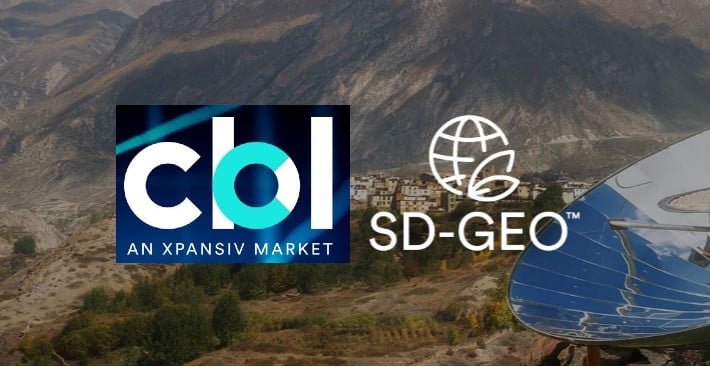Xpansiv Market CBL launched a new benchmark carbon offset contract called Sustainable Development Global Emissions Offset Contract (SD-GEO).
Xpansiv is a market infrastructure and data platform for environmental commodities. One of the firm’s main business units is the CBL, the largest spot exchange for ESG commodities such as carbon, renewable energy certificates, and digital natural gas.
The new standardized offset contract called SD-GEO trades on Xpansiv market CBL. Its announcement comes after Xpansiv firm APX, one of the leading registry and ledger providers for environmental markets, launched ESGclear.
The Xpansiv CBL’s SD-GEO
Before CBL SD-GEO, there were two other contracts under the market’s GEO line of products:
- the CBL Nature-Based Global Emissions Offset (N-GEO), and
- the CBL Core Global Emissions Offset (C-GEO) contracts.
All these offset contracts are based on the voluntary carbon offset market (VCM). Carbon offsets are carbon credits in the VCM.
The GEO product suite were launched by the Chicago Mercantile Exchange (CME Group), the world’s largest derivatives marketplace. Their creation is a response to the growing demand for carbon offset products in the carbon space.
- And now Xpansiv market CBL introduces its most recent product under its GEO series: SD-GEO.
CBL SD-GEO offers a benchmark for market players to transact high-quality carbon offsets from projects that promise to bring social impact, too.
The new contract is essential to liquidity and price discovery in the emerging household device market. As such, it helps simplify the selection process for those who want to buy high-quality offsets with assured integrity and validation.
In particular, CBL SD-GEO will enable the delivery of cookstove projects that deliver at least five UN Sustainable Development Goals (SDGs) either from Verra or Gold Standard. This ensures that CBL SD-GEO credits have substantial co-benefits apart from abating carbon emissions.
Those projects must follow the Xpansiv CBL Standard Instruments Program that consists of the Global Emissions Offset (GEO). It’s the first in the standardized offset contracts established by Xpansiv.
Cookstove projects focus on delivering positive impacts to local communities and often touch the following SDGs:
- No Poverty (SDG 1)
- Good Health and Well-Being (SDG 3)
- Gender Equality (SDG 5)
- Affordable and Clean Energy (SDG 7)
- Responsible Consumption and Production (SDG 12)
- Climate Action (SDG 13)
Russell Karas, Xpansiv Head of Carbon Market Development, noted that:
“Corporates often look for offset projects that mitigate emissions while also having co-benefits for local communities—projects like clean cookstoves… This emerging segment of the carbon market will grow exponentially in the coming years, and Xpansiv offers a better way to price and trade these high-quality credits.”
The Concept of Co-Benefits
Co-benefits refer to the additional outcomes from carbon projects that benefit society in general. They include benefits that go above and beyond the direct impact of mitigating climate change.
- Co-benefits are often identified under the three pillars of sustainability — social, environmental, and economic.
Common examples of co-benefits are cleaner air, creation of local jobs, improved public health, and promotion of biodiversity.
The concept of co-benefits is not new to CBL’s standardized offset contracts. According to Xpansiv Chief Commercial Officer Ben Stuart, the CBL N-GEO also calls for a Climate, Community, and Biodiversity accreditation from Verra. He also added that:
“The SD-GEO is the next contract in the GEO series that will bring transparency, price certainty, and a simplified selection process to a vital subset of the offset market—another important step toward a carbon-neutral future.”
Amid the various types of offset projects, clean cookstoves is one among them that brings sustainable development impact. It falls under the low-cost environmental and community-based energy efficiency projects.
Clean cookstoves allow households to switch to an efficient cooking solution. They’re far more efficient than traditional mud/stone fire cookstoves. Plus, they also reduce the use of firewood as fuel, avoiding CO2 emission.
In particular, for a carbon project developer C-Quest Capital (CQC), their clean cookstove projects can deliver about 9 to 11 SDGs. They bring permanent and verifiable improvements to the rural poor communities.
CQC’s Chief Commercial Officer remarked that:
“As one of the leading clean cookstove project developers, we welcome Xpansiv’s initiative, setting a core impact benchmark for this project type and establishing a robust market that will support the future of clean cookstove projects…”
While for other investors of Xpansiv, the introduction of CBL SD-GEO serves as a pivotal moment that simplifies the race to net zero. Entities will now have transparent, direct access to high-quality carbon credits with co-benefits.
Xpansiv market CBL said that SD-GEO will start to trade on 5 December.

